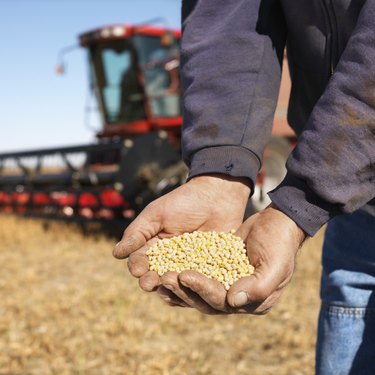
Soy nut butter is a peanut butter substitute made from roasted soybeans, rather than peanuts. Soy nut butter was originally developed for people with allergies to peanuts and tree nuts. You can get many of the nutritional benefits with soy nut butter as you can regular peanut butter and, in many cases, soy nut butter has better nutrition. Soy nut butter contains no gluten or dairy products.
Servings and Calories
Video of the Day
A serving of both soy nut butter and peanut butter is 2 tablespoons, or 32 grams. Soy nut butter contains 170 calories per serving, while peanut butter has 190. Similarly, soy nut butter has 100 calories from fat, while peanut butter has 130. A serving of soy nut butter represents about 9 percent of a typical 2,000-calorie diet, and a serving of peanut butter represents about 10 percent.
Video of the Day
Fats
A serving of soy nut butter contains 11 grams of fat, while regular peanut butter contains 16 grams. Soy nut butter contains half the saturated fat as that of peanut butter, with 1.5 grams compared to 3 grams per serving. Both soy nut butter and peanut butter offer a rich supply of healthy unsaturated fats, and both are free of trans fat and cholesterol.
Carbohydrates
Soy nut butter contains 10 grams of carbohydrates per serving, while regular peanut butter contains 7 grams. Soy nut butter offers slightly more fiber than peanut butter as well, with 3 grams compared to 2 grams. Both soy nut butter and regular peanut butter contain 3 grams of sugar.
Protein
Soy nut butter and peanut butter are both high in protein. A 2 tablespoon serving of both soy nut butter and peanut butter provides 7 grams of protein. Protein should comprise at least 10 percent of your total caloric intake, so if you follow a 2,000-calorie diet, you need at least 50 grams of protein each day. A serving of both soy nut butter and peanut butter represents about 14 percent the daily value for protein based on a 2,000-calorie diet.
Vitamins and Minerals
Peanut butter has a wider vitamin and mineral profile than soy nut butter. Peanut butter contains 20 percent the daily value for niacin; 15 percent that of vitamin E; and moderate amounts of both iron and riboflavin. Soy nut butter contains 6 percent of the daily value for calcium, and a moderate amount of iron. Soy nut butter and peanut butter have similar sodium content with 140 and 150 milligrams per serving, respectively.